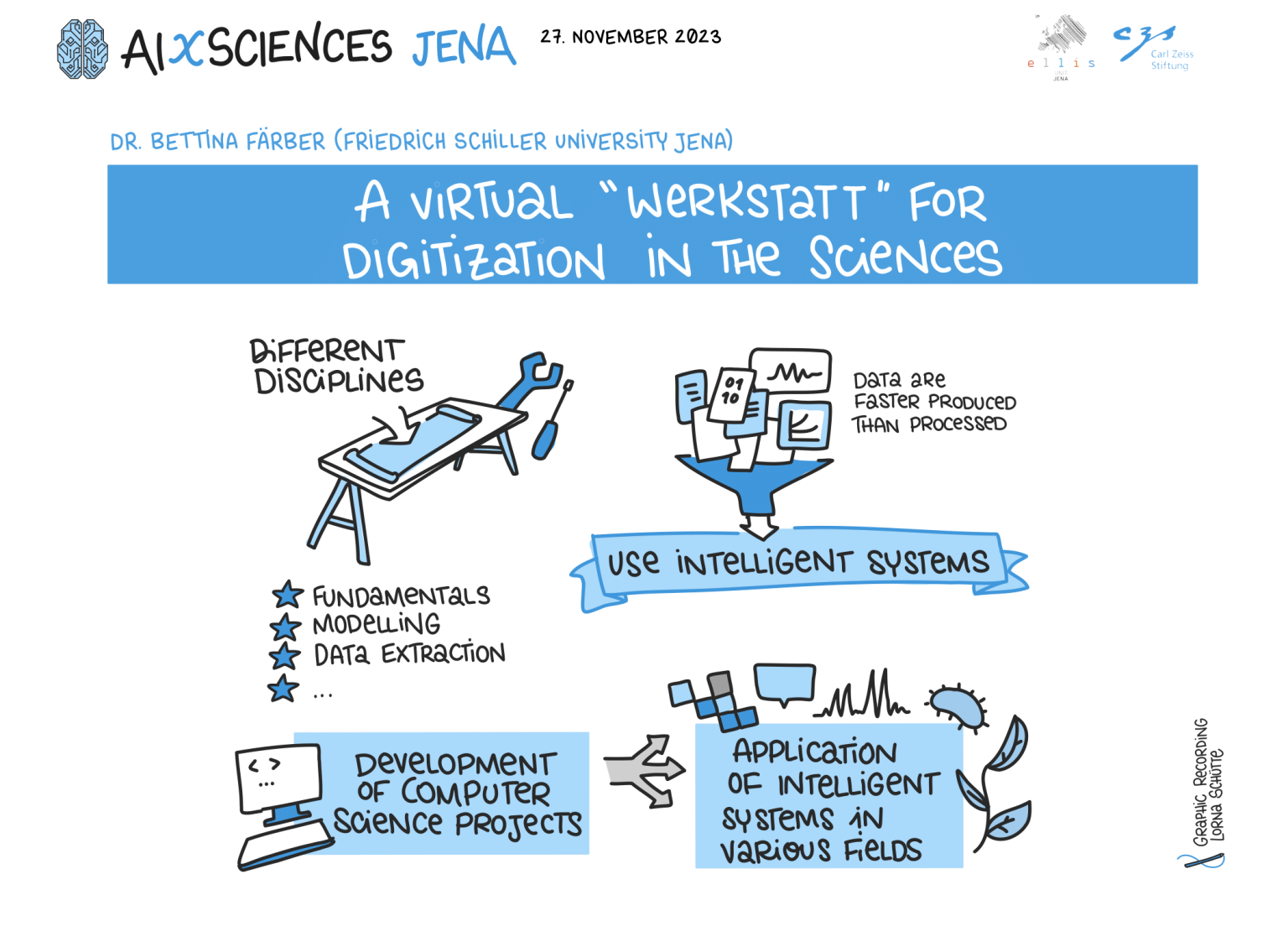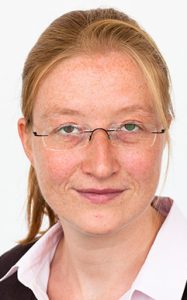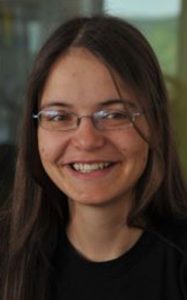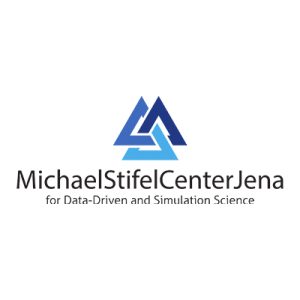CZS supported AI projects – session 1
10:30 AM – 11:40 PM
A virtual “Werkstatt” for digitization in the sciences
Data has become central in almost all scientific disciplines. Despite the abundance of data, data science has not had a considerable impact on research for understanding complex natural systems and phenomena in earth sciences, medicine, psychology, and physics, among many other disciplines. Significant challenges have emerged in recent years concerning data use, analysis, storage, etc. To tackle some of these challenges, the project ‘A virtual “Werkstatt” for digitization in the sciences’ focuses on developing intelligent systems in three key areas of data science: 1. Generic tools for machine learning, 2. Knowledge generation from data using machine learning processes, and 3. Semantic methods for the data life cycle. It also supports scientific research and collaborations on the applications of these key topics in different scientific disciplines. Funded by the Carl-Zeiss-Stiftung, the project started in April 2019 and will continue till March 2024. It has already fostered a high level of diversity regarding disciplines represented, seniority, gender, and nationality. Many interdisciplinary collaborations between different institutes of the Friedrich Schiller University Jena have been established, resulting in several scientific contributions and breakthroughs. In this talk, we will briefly introduce the structural framework of the “Werkstatt” project, its members, and its goals. We will then summarize the project‘s main results, established networks, activities, and milestones achieved. We will touch on some success stories, deviations, and challenges encountered. Finally, as the project is approaching its final phase, we will shortly discuss how the results of this project can be sustained and built upon in the future.
Speaker
Dr. Bettina Färber is scientific coordinator of Michael Stifel Center Jena (MSCJ) for Data-Driven and Simulation Science. The center promotes interdisciplinary scientific exchange and cooperation within the University of Jena and beyond, thus enabling cutting-edge research in Jena. It also shapes education and training in this rapidly developing field. In addition, the MSCJ is host of the Competence Center Digital Research (zedif) which provides support to the scientists of the university in all aspects of digital research. Dr. Färber also coordinates the project „A virtual “Werkstatt” for digitization in the sciences“ which is hosted at MSCJ.
The scientific background of Dr. Färber is zoology: animal morphology, histology and palaeontology. She received her PhD degree in 2011 form the University of Jena. In 2017, Dr. Färber started to work at the Research Data Management Helpdesk of the university (since 2021 part of zedif) and is still closely collaborating with them.
Dr. Sheeba Samuel is a postdoctoral researcher at the Heinz-Nixdorf Chair for Distributed Information Systems at Friedrich Schiller University Jena, where she received her PhD in 2019. Prior to pursuing her doctoral studies, she worked at Aruba, a Hewlett Packard Enterprise Company from 2013-2015. She is a member of the Michael Stifel Center Jena and is conducting one of the core projects of the “A virtual “Werkstatt” for digitization in the sciences” project: „Integrated provenance management“. Her research interests include data provenance, reproducible research, semantic web, and knowledge graphs.
Dr. Maha Shadaydeh received the PhD degree in electrical and communications engineering from Tohoku University, Sendai, Japan in 1999. She was an Associate Professor of signal processing with the Electronic Engineering Department, Damascus University, Syria, from 2000 to 2011, and a Researcher with the Institute for Computer Science and Control, Hungarian Academy of Sciences (MTA SZTAKI), from 2012 to 2016. Since 2017, she has been working as a researcher and a team leader with the Computer Vision Group, Department of Mathematics and Computer Science, Friedrich Schiller University Jena. Her research interests include dynamical system analysis, remote sensing and biomedical signal processing, event detection, and causal reasoning. In the project „A virtual “Werkstatt” for digitization in the sciences“, Dr. Shadaydeh is conducting one of the three core projects: „Generative Models“.
Data is playing an increasingly important role in many scientific disciplines. However, their processing and subsequent use pose great challenges. Intelligent systems that use machine learning methods, for example, promise a remedy here. This makes it possible to extract knowledge and either completely automate processing steps from acquisition and analysis to storage and subsequent use, or to complete them more efficiently in cooperation between humans and machines. With a virtual “Werkstatt” for the digitization in the sciences at the Michael Stifel Center Jena (MSCJ) for Data-Driven and Simulation Science, the University of Jena contributes to the realization of this vision. Here, expertise from computer science and application disciplines (including bioinformatics, biomedicine, biology, computer linguistics, geography, geophysics and physics) are brought together and researchers, from master’s students to professors, are working in an interdisciplinary manner. The “Werkstatt” initially focused on the advancement of methods and tools for the fundamentals as well as applications of machine learning and semantic methods, and on basic questions from the applied research disciplines. In addition, the “Werkstatt” provides the MSCJ researchers from the University of Jena, the Max Planck Institutes for Biogeochemistry and Geoanthropology (formerly “Human History”) as well as the DLR Institute of Data Science with a bundle of tools for networking and promoting young researchers. It thus offers an ideal framework for the advancement of sustainable, continuous and interdisciplinary research in all areas of digitization at the Jena location.

Project leader
Prof. Dr. Birgitta König-Ries holds the Heinz-Nixdorf Chair for Distributed Information Systems at Friedrich-Schiller-Universität Jena. The central research theme in her working group is the distributed, automized usage of resources, i.e., information and functionality, in heterogeneous, dynamic environments. An important application area for the solutions developed is research data management, in particular for biodiversity research projects. The group develops a research data management platform, BEXIS 2, and works on tools to improve data FAIRness and reproducibility of research. Semantic web technology and other AI methods are used in many of the projects to achieve these goals.
Prof. König-Ries, among further roles in a lot of other research initiatives, is the managing director of Michael Stifel Center Jena (MSCJ) for Data-Driven and Simulation Science. The project „A virtual “Werkstatt” for digitization in the sciences“, which Prof. König-Ries is leading, is hosted at MSCJ. The Principle Invesigators (PIs) of the subprojects are active in MSCJ. Within the project, Prof. König-Ries is Co-PI of one of the three core projects (conducted by postdocs): „Integrated provenance management“, and one of the 15 pilot projects (conducted by PhD students): „Learning from data annotations“.
Main PIs of subprojects






















